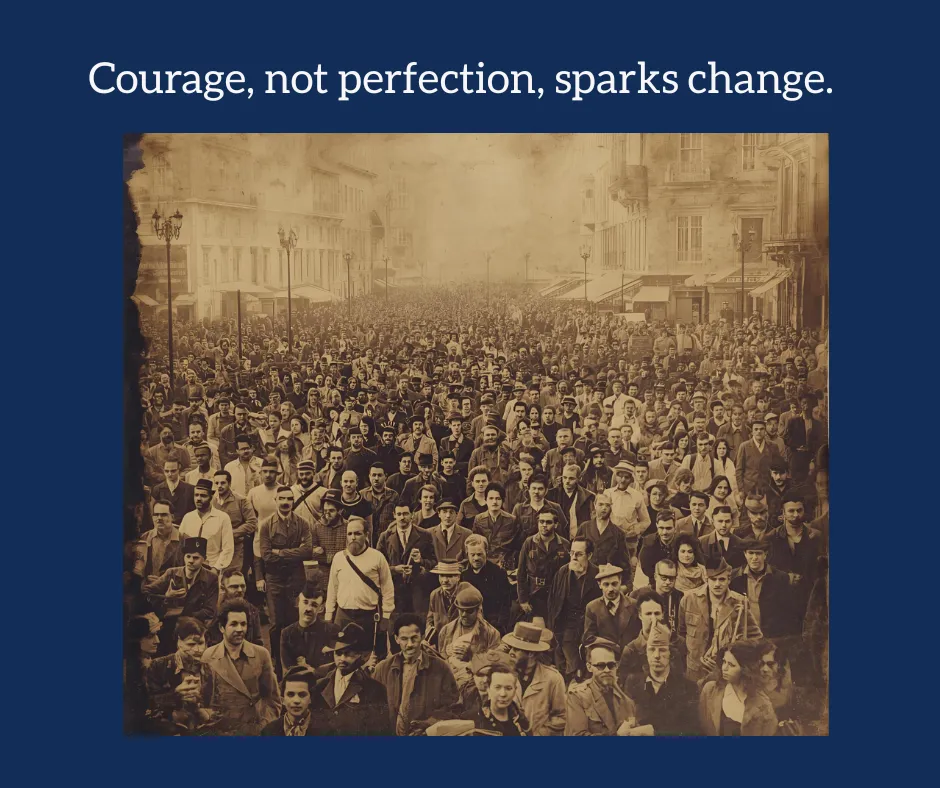
Blogs

The Courage to Speak Up—Lessons from the First Labor Day
Picture this: It’s September 5, 1882. The streets of lower Manhattan are buzzing. A jewelers’ band from Newark strikes up a tune and a modest line of workers—tailors, machinists, and carpenters—falls in step behind them. By the time the parade reaches Union Square, thousands have joined, banners raised high. These men and women aren’t polished orators. They’re ordinary people—immigrants, craftsmen, laborers—nervous, unsure, and maybe even a little afraid. But they’ve decided that their voices matter. And that courage changed history.
That march would become the first celebration of Labor Day, a holiday that honors the people who built the backbone of our country. It’s easy to forget that it started with people who didn’t see themselves as leaders or speakers—people who spoke up anyway.
Ordinary People, Extraordinary Impact
The labor movement of the late 1800s wasn’t powered by polished speeches or grand stages. It was fueled by everyday workers fed up with grueling hours, dangerous conditions, and low pay. They weren’t trained in rhetoric or persuasion. Many barely had time to sleep between long shifts.
Yet, they found the courage to show up—on picket lines, in meetings, and at rallies. They learned that their imperfect voices, united in purpose, were enough to spark change.
By 1894, just twelve years after that first parade, President Grover Cleveland signed a law making Labor Day a federal holiday. That moment of courage, from people who could easily have stayed quiet, built a legacy that continues today.
What We Can Learn from Them
Standing up—especially for the first time—isn’t easy. Whether you’re preparing to give your first presentation, share your opinion in a meeting, or introduce yourself at a networking event, those nerves can be overwhelming.
It’s tempting to believe you need more practice, more polish, or more confidence before you can step into the spotlight. But those early workers didn’t wait to feel ready. They showed up with shaky voices and beating hearts because what they had to say mattered.
And here’s the truth: Your voice matters, too.
Courage isn’t the absence of fear. Courage is speaking up in spite of it. And just like those workers, your willingness to share your ideas—even when you feel nervous—can make an impact you can’t yet see.
From Parades to Presentations
Think about how nerve-racking it must have been to join that first parade. There was no guarantee of success, no promise that their efforts would lead to safer workplaces or better wages. For all they knew, they’d march through the streets and be ignored—or worse.
Now think about your own moments of hesitation:
The networking event where you want to meet new people but dread introducing yourself.
The team meeting where you have an idea but your heart pounds too loudly to speak up.
The presentation you’ve been asked to give where you’re sure everyone will notice how nervous you feel.
Those moments may not feel historic, but they are pivotal. Every time you step up, you build confidence and show yourself—and others—that your voice is worth hearing.
Just like those workers, you don’t have to be perfect. You just have to show up.
Practical Ways to Harness That Courage
Here’s how you can take a page from the courage of those early labor leaders:
Start small. Speak up in a smaller setting, like a team huddle, before tackling a bigger audience.
Focus on your purpose. When you remember why you’re speaking, the fear becomes a little less important.
Practice presence. Take a deep breath, stand tall, and remind yourself you belong in the room.
Embrace imperfection. Even if your voice shakes or you stumble over a word, your authenticity is what people connect with most.
Each time you speak, you’re building a muscle. Just like those workers built a movement by showing up again and again, you’re building the foundation of your confidence.
Your Voice Is Your Power
Labor Day isn’t just about barbecues and parades. It’s a reminder of what happens when ordinary people decide that their voices matter.
When you’re standing at the edge of your own moment—hesitating before you raise your hand in a meeting or step up to a microphone—remember that courage isn’t about perfection. It’s about presence.
Those workers in 1882 didn’t wait until they were flawless to take action. They showed up as they were—nervous, imperfect, but determined. And that was enough to create a national movement that changed lives.
So this Labor Day, honor their courage by honoring your own. Speak up. Share your ideas. Let your voice be heard. Because you never know who’s waiting to hear exactly what you have to say.
A Final Word of Encouragement
Every confident speaker you admire started where you are now—nervous, uncertain, and afraid of getting it wrong. What set them apart wasn’t talent or training. It was their willingness to start.
So take that first step. Your future self—and maybe even the people who need to hear your message—will thank you.



